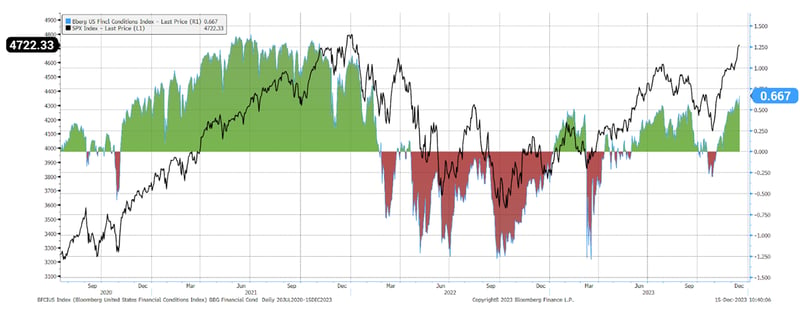HCM Insights
Unpacking Financial Conditions: What They Are and Why They Matter

In today's rapidly evolving economic landscape, understanding financial conditions is essential for investors, policymakers, businesses, and others focused on the health of the economy. Financial conditions refer to a complex mix of financial factors (expressed in indices) that collectively paint a picture of the availability and cost of credit and its impact on economic vitality.
In fact, at this month’s Federal Open Market Committee (FOMC or Fed) press conference, Chairman Powell underscored the significance financial conditions have in the formation of monetary policy, specifically pointing to their role in the development of the Fed’s Dec. 13, 2023 Summary of Economic Projections.
Let’s take a closer look at financial conditions, how they’re measured, and why they matter.
Financial Conditions 101
Financial conditions indices (FCIs) encapsulate a wide range of financial and economic information that offer insights into the health of the financial system and, relatedly, prospects for economic growth. These include interest rates, credit spreads, market volatility, the exchange rate, and stock prices, among others.
When credit is easily accessible and relatively inexpensive (in other words: when financial conditions are easing), the potential for increased consumer spending and corporate investment grows. For example, people may be more likely to buy a house or car if they can get a loan with preferable terms and reasonable borrowing rates.
Not surprisingly, then, changes in financial conditions can be associated with security market activity. While not causally connected to equity markets, financial conditions serve as a backdrop that often corroborates market direction and strength. As credit conditions become more favorable, perceptions of business risk can change, suggesting a more bullish outlook on risk assets.
Take current financial conditions, for example. As measured by the Bloomberg U.S. Financial Conditions Index (BFCI), they’re at their easiest levels of the year (0.667), affirming the equity market’s 2023 year-end rally and highlighting their typical, but not absolute, correspondent association with equity markets generally. This is shown in the graph below.
Interestingly, easing financial conditions also set the scene for the equity rally in October 2022, which took many by surprise, given the bearish sentiment at the time. Since then, financial conditions have been a primary catalyst for the rallies and drawdowns throughout 2023. (This is also illustrated in the graph below.)
Bloomberg U.S. Financial Conditions Index (BFCI)
7-20-20 to 12-15-23

Source: Bloomberg Finance, L.P.
Selected Financial Conditions Indices (FCIs)
At a high level, FCIs are comprised of disparate variables that are normalized一adjusted to a common scale一weighted, and combined into a single index value. That value is typically a relative value compared to a baseline time series. Thus, index values illustrate how current financial conditions and trends compare一are they looser or tighter, for example一versus an established baseline.
Likewise, FCIs differ in the underlying data included (though there is considerable overlap), the finer points of methodology used to calculate them, and whether time lags are reflected in index values. Some of the more commonly used FCIs are described below.
Bloomberg U.S. Financial Conditions Index (BFCI)
The BFCI is a daily index broadly used by market participants for a market-based assessment of financial conditions. It measures the relative availability and cost of credit as evidenced by financial stress in the fixed-income, money, and equity markets. As such, credit spreads between treasury securities, municipals, commercial paper, and other lending rates play significant roles in the index calculation. Other factors include the S&P 500 index (S&P 500) and Chicago Board Options Exchange (CBOE) Volatility Index (VIX), a measure of the market’s expectations of S&P 500 price volatility over the next 30 days.
As seen in the graph above, a positive value indicates easing financial conditions, while a negative value suggests tighter conditions.
Financial Conditions Impulse of Growth (FCI-G)
The Financial Conditions Impulse of Growth (FCI-G), a monthly FCI, is the Fed’s measure of the broader impacts of monetary policy beyond just short-term interest rates. Unlike other FCIs, the FCI-G incorporates a wider range of variables, including the federal funds rate, longer-dated government yields, credit spreads, equity prices, the exchange rate, mortgage rates, and housing prices.
This comprehensive approach is designed to provide a more nuanced understanding of how monetary policy affects the economy. The weighting of each component is determined based on its presumed impact on future gross domestic product (GDP) growth using model simulations.
Additionally, the FCI-G includes the impact of lag periods from changes in financial conditions on economic growth. The one-year version focuses on the shorter-term impact, while the three-year version provides insights into the longer-term effects.
Goldman Sachs U.S. Financial Conditions Index (GSFCI)
Goldman Sachs’ FCI includes fewer variables than other models and is designed to capture their contributions to macroeconomic activity. The main variables include treasury rates (the 10-year T-bill rate), the exchange rate, equity valuations, and credit spreads (especially corporate BBB spreads). These are weighted based on their respective impact on GDP.
Index values vary around an average GSFCI base level of 100. Indications under 100 signify more accommodative conditions, whereas increases indicate tighter financial conditions. For example, a one-point increase is estimated to reduce GDP growth by one percent in one year.
National Financial Conditions Index (NFCI)
The Federal Reserve Bank of Chicago calculates the weekly National Financial Conditions Index (NFCI). This includes 105 variables related to risk, credit, and leverage in the financial system itself, rather than their impact on GDP growth. Variable categories cover credit default swap (CDS) indices, credit spreads, and commodities market depth, among others.
The index has an average value of zero and a standard deviation of one over a time series beginning in 1971. Positive values are associated with tighter-than-average financial conditions, and negative values suggest the opposite.
Why Financial Conditions Are Important
Financial conditions can provide vital information to policymakers, investors, and businesses across various contexts. They include:
Central Bank Policy
As referenced earlier, the Fed and other central banks use financial conditions to assess the impact of monetary policy on the wider economy. For example, tight financial conditions might prompt central banks to implement more accommodative policies, affecting interest rates, consumer demand, and business investment.
Broader Economic Analysis
Since FCIs consist of economic data, they can provide valuable insights into the direction and health of the economy. Securities markets are closely tied to economic performance; thus, forecasts can be crucial for determining investment strategies and tactics.
Investor Confidence
By providing a comprehensive view of financial conditions, FCIs can influence investor confidence. Favorable financial conditions can boost confidence, leading to increased investment in securities markets.
Market Liquidity
FCIs often include measures of liquidity, which are critical to securities markets. Liquidity reflects the ease with which assets can be converted to cash without significantly impacting the market price.
Risk Management
Investors and fund managers also use FCIs to assess risk in the market. Understanding current financial conditions helps inform decisions about portfolio allocation and risk exposure.
In short, it’s difficult to overstate the importance of financial conditions. They offer crucial insights into the economy’s current state and future direction, influencing decisions made by a broad spectrum of stakeholders and providing context for market movement.
At Hilton, FCIs play a pivotal role in our investment and portfolio construction processes. By integrating FCIs into our analytical framework, we can gain a more nuanced understanding of the financial landscape, enabling better-informed decisions and opportunities for growth.
The information set forth in this article should not be construed as personalized investment advice. There is no guarantee that the views and opinions expressed in this article will come to pass. Investing in the markets involves gains and losses and may not be suitable for all investors. The information set forth in this article should not be considered a solicitation to buy or sell any security.









